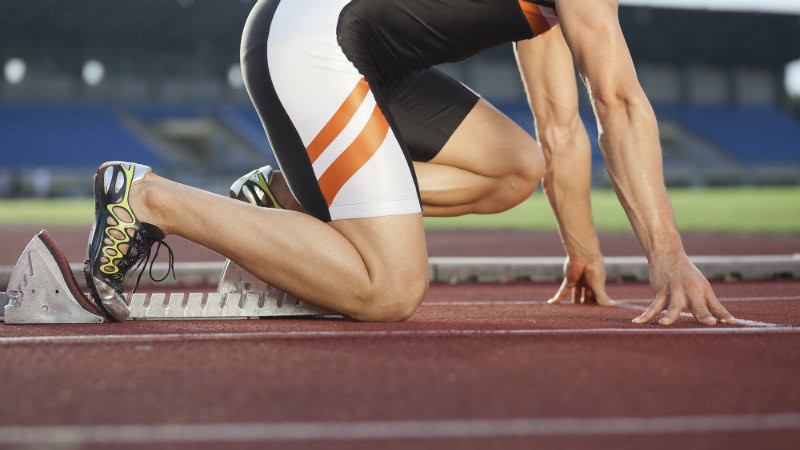If there was one overriding moment that captured the spirit of the last Olympic Games then it would surely be the events on day eight of the competition, Saturday 4 August.
On a balmy August night in London, in the space of just 44 minutes, Jessica Ennis, Greg Rutherford and Mo Farah all struck Gold, adding to a Team GB medal tally that would end up smashing all expectations. That evening would become known as 'Super Saturday'.
It was a satisfying achievement for British Athletics and Team GB to win these medals.
But Super Saturday was not something that just happened by chance on that evening, it was also the culmination of years and months of careful planning and preparation.
'Being the host nation and having a fantastic atmosphere and support in the stadium that night would have most certainly spurred the athletes on', suggests Dr Rachel Arnold, sport psychologist from our Department for Health.
'However, it is also important to pay credit to the excellent preparations that had been put in place by the British Olympic Association and the nation’s various Governing Bodies in the lead up to the Games to unite all athletes within the “One Team GB” banner, and ensure that athletes were optimally prepared to thrive in London', she tells me.
Realising a lifetime’s ambition
The Olympic Games can be stressful for those competing: a lifetime’s training and ambition about to be realised in front of packed stadia, not to mention witnessed by a global TV audience stretching into the multimillions. The stakes in sport will never be higher and there’s a slim margin of error between success and failure. Getting it all to come together at the right point is the key and it’s a subject Rachel knows a thing or two about.
As an early career researcher, her work has focused on how sports organisations can best support athletes. Since her Masters and PhD, she's had studies linked to both the Beijing and London Games.
On a personal level, her husband, John Jackson, has been selected to play at the Rio Olympics for the Ireland Men’s Hockey Team, so Rachel is likely to gain some first-hand experience of the stresses that come from competing on the global stage.
Rachel's research
In one of Rachel's early studies, she interviewed the nation’s Olympic performance directors, exploring best practice performance leadership in elite sport, uncovering recommendations and factors that might influence the directors' performances.
In other studies, Rachel and her colleagues investigated the factors associated with the design and delivery of an effective Olympic Games preparation camp and interviewed world-leading sport psychologists about preparing athletes and teams for this pinnacle event.
Turning to the athletes themselves, Rachel has conducted a multi-study project which involved synthesising information from over 1000 sport performers and trying to understand and measure the many ‘stressors’ at play, how they differ across various performers, and mapping ways that organisers could mitigate against or manage them.
'This study showed that stressors emanate from a wide range of sources within the sport environment. It is surprising, then, when stress management interventions in sport psychology typically place a lot of onus on the athlete to change their psychological reactions to stressors. Instead of viewing stress as this personal issue, it is crucial for sports organisations to acknowledge the full impact of their own processes and procedures in addressing stress in athletes', she explains.
'Through this study, we identified key themes that organising teams really need to be mindful of when preparing athletes. These range from the impact of different leadership and management styles to travel and accommodation logistics, right through to the team culture and atmosphere and how individuals are supported with injuries or finances.'
Inoculating against stress
'We work with sports organisations to design and implement more proactive and primary stress management strategies, helping them to try to reduce the dimensions of the stressors that their athletes encounter. Concurrently, we help athletes to plan for stressors and modify their responses to them.
'Important strategies we use in sport psychology are stress inoculation - where we expose the athlete to the stressor in a supportive and controllable environment - and "what if" planning – to help the athlete think about the whole host of different scenarios that could come up and then effectively plan against them.'
International collaborations
As attention shifts to Brazil this summer, Rachel will visit our international colleagues at the University of Sao Paulo, thanks to support from the International Relations Office’s Research Initiator Scheme.
While at the University, Rachel will share her latest learning on the stress experienced by athletes with a disability and develop a research collaboration. She will also present her work at a major international science, education, and medicine in sport conference, taking place in Santos between the Olympic and Paralympic Games.
Through such collaboration, her work has the potential to influence how teams manage preparations in the lead up to major international competitions, such as the 2020 Olympic Games in Tokyo.
After Rio, Rachel will be working with the English Institute of Sport to disseminate these findings to governing bodies and other relevant stakeholders. This will be supported by a new PhD, starting in September, which will focus on how stressors can impact performance, well-being and biochemical measurements of illness and infection.
